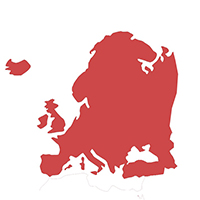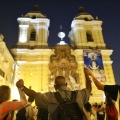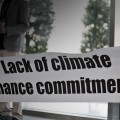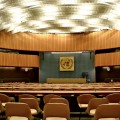The highly anticipated encyclical will be released on June 18, Catholic News Service has announced. The encyclical will focus on climate change and will urge the 1.2 billion Catholics around the world to care for God’s creation. It is also expected to spur discussion in other religious circles.
Encyclicals shed light on problems the Roman Catholic Church perceives as issues of the day, with the last encyclical, focusing on faith, being decreed in 2013. Historically, encyclicals have been written on the dignity of women and the rights of workers. Academics predict that the Pope will link social justice to ecological justice, emphasise the disproportionate impacts of climate change on the vulnerable, and talk about the ‘sin’ of environmental degradation in this encyclical, though not without offering a gesture of hope. The encyclical will be entitled ‘Laudato Sii’ or ‘Laudes Creaturarum’, meaning ‘praise of the creatures’ hints at the positive exhortative tone the Pope will adopt, injecting a breath of fresh air in a field that constantly receives negative messaging, which some environmental advocates argue paralyses more than empowers people to action. The encyclical will be received with serious respect and consideration from the Catholic community and is likely to be implemented into religious education in seminaries and schools. For example, teachings from the encyclical are likely to be integrated in the curriculum at the Jesuit Conference, which has one of the largest private education systems in the world.
Although the study of religion and ecology has been featured in communications from the Holy See since the 1960s, this encyclical will be one of the first religious teachings addressing climate change specifically. Last December, Catholic bishops from around the world signed a statement, calling for an end to the use of fossil fuel use. The encyclical will build on this momentum, launching it beyond religious circles to the general public, especially with the weight that Pope Francis throws behind it. This is what pundits are calling the ‘Francis Effect’, where the popularity of Pope Francis attracts Catholics and non-Catholics alike.
While the Vatican speaking to the global Catholic community is not new, a Pope releasing an encyclical to try and influence the political realm is. This can be seen in the timing of the encyclical’s release which corresponds not only with the Paris process but also the Sustainable Development Goal process, indicating that the Vatican would like to mobilise the Catholic community around these events.
Additionally, in September, Pope Francis will visit the United States and address the General Assembly of the United Nations and a joint session of the US Congress. In America, 167 (out of 535) of the elected representatives in Congress are Roman Catholics. According to a survey on the perception of climate change among Christians in the United States, approximately seven in ten Catholics think that global warming is happening, higher than the rate among Protestants and Evangelicals.
However, the impact of the encyclical on actual policy outcomes at the UN climate talks in Paris later this year remains to be seen. Although faith-based communities have been acting as a moral voice at previous conferences, their involvement tends be limited to side events within the process or parallel events happening independent of the negotiations process. Unlike the Pope’s role as mediator between Cuba and the United States, the impact of the encyclical on climate change policy is more tenuous as many more than two countries are involved and the issues at play are complex, ranging from mitigation responsibilities to the distribution of finance.
Still, the timing of the encyclical suggests that the Pope hopes to mobilise Catholics around political processes, impacting policy outcomes indirectly through grassroots activism. By making climate change a mainstream issue among the wider Catholic community, more political pressure will be exerted on policymakers as they negotiate the Paris outcomes. In addition, the encyclical will add to the growing momentum of grassroots action that seeks to reclaim the importance of individual responsibility. For example, Interfaith Power and Light, an interfaith organisation represented in 40 states, has convinced more than 60 congregations to undertake the ‘Paris Pledge‘, under which communities reduce their carbon footprint by 50% by 2030, a call they also issue to nations.
Religious leaders and activists are hopeful. In a panel discussion on the encyclical held at Yale in April, Dekila Chungyalpa, the 2014 McCluskey Fellow in Conservation, suggests that the papal encyclical matters to people of other faiths because it is a moment of convergence. “It is not just one religious leader that is speaking up on it. We are seeing a chorus of voices coming from around the world,” she said at a panel discussion.
“There is such a movement working around the world and it is not just a theoretical movement. It is a very practical movement… churches are doing what they can to change their footprint, and [there are] monasteries in the Himalayas and religious institutions that are working on this.”
As environmental advocates galvanise to build momentum for the Paris talks later this year, they can be assured that the weight of the religious community stands behind them.
The primary version of the encyclical will be in Latin, but will be translated to various languages. It will be released on the Vatican website.













comment